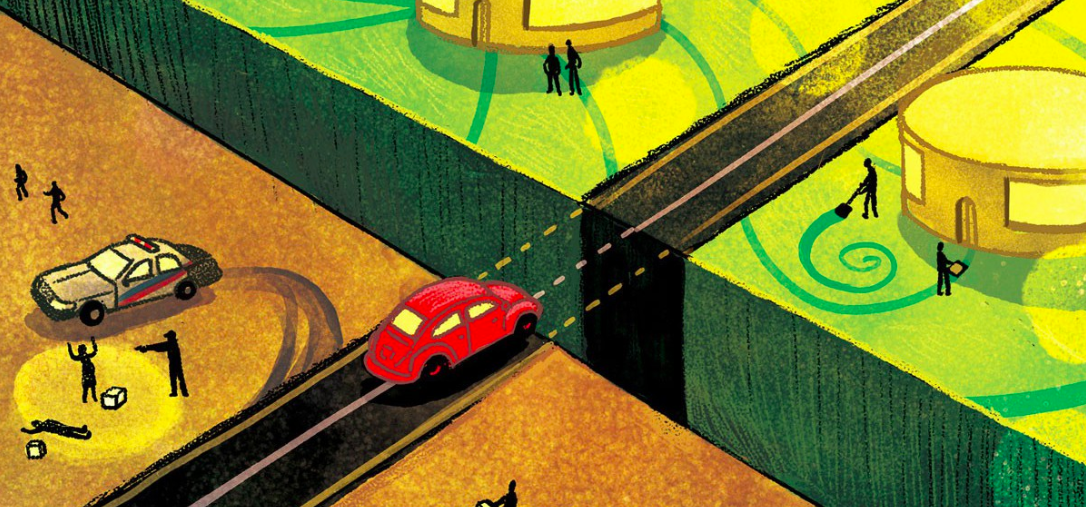Illustration: Derrick Chow
PUBLISHED IN BRIARPATCH MAGAZINE (CANADA), 1 NOVEMBER 2015.
It’s the summer of 1986. Think Top Gun and Glasnost and the depths of a renewed Cold War that the Eastern bloc is losing. Reagan is in the middle of his second term. Thatcher is set to win her third term. Socialist French President François Mitterrand has long since abandoned the radical program he was elected on in the face of capital flight, rising inflation, and economic sabotage. It is becoming very clear to some on the left that the rightward turn that began in the late 1970s across much of the West is no temporary setback or routine swinging of the political pendulum. The unions have been roundly beaten almost everywhere. With the postwar economic boom long gone bust, the balance of forces – political, economic, and industrial – are not in the left’s favour.
Amid the spreading demoralization, a paper appears in an academic journal that acknowledges the despair but aims to provide new hope. Abandon all aspirations of achieving socialism, a pair of Dutch and Belgian authors declare; it is an unnecessary detour anyway! Instead, look to what they call “A Capitalist Road to Communism.”
“Prospects for the Left look bleak indeed. Electoral disasters (on the British pattern) and policy U-turns (on the French pattern) have reinforced the suspicion that socialism may forever remain out of reach,” wrote Robert van der Veen and Philippe Van Parijs.
“[A]ctually existing socialist societies have repeatedly failed to provide an attractive picture of socialism,” they submitted. “Compounded by mounting disillusionment with the achievements of State intervention in the West, this failure has shaken many people’s faith in the very desirability of socialism.”
Van der Veen and Van Parijs argued that this state of affairs had to be accepted. Their pitch, nonetheless, was that the central principles of communism could be constructed inside of capitalism via the policy innovation of a guaranteed basic income, bypassing the need for the election of a socialist government, workers’ control of industry, central planning, or the elimination of private property, much less a socialist revolution.
“Capitalist Road” would prove to be a seminal paper, launching the modern discussion on the left of a basic income, meaning a modest sum “paid by a government, at a uniform level and at regular intervals, to each adult member of society … irrespective of whether the person is rich or poor, lives alone or with others, is willing to work or not.”
The key selling point to a basic income for Van Parijs, van der Veen, and contemporary leftist champions of the concept is that it undermines the necessity of work, eliminating the need to sell your labour to a boss in order to survive.
Fearing social unrest due to massive permanent unemployment, today there are leading capitalists who share in the renewed enthusiasm for basic income policy.
In August, Citigroup chief economist Willem Buiter issued a report discussing growing inequality and “robot angst” as automation supposedly supplants workers. Key to avoiding the danger of a “bifurcating” world, Buiter says, is “a guaranteed minimum income for all, or an ambitious negative income tax … to support those left behind by technological advance.”
Editorialists in the Financial Times and the free-market Economist have backed or flirted with some form of basic income, as have centre-left economists like Robert Reich and Paul Krugman. The UK’s Green party put basic income policy at the forefront of its spring election campaign, cost out to an eye-watering £331 billion but made revenue-neutral via the abolition of a raft of welfare provisions including child benefits. The new leader of the Labour party, Jeremy Corbyn, views the idea favourably, and there are basic income pilot projects moving ahead in Switzerland, Finland, and the Netherlands. This fall, the New Democratic opposition in Saskatchewan called for a guaranteed basic income pilot project.
Basic income policy is having its moment.
